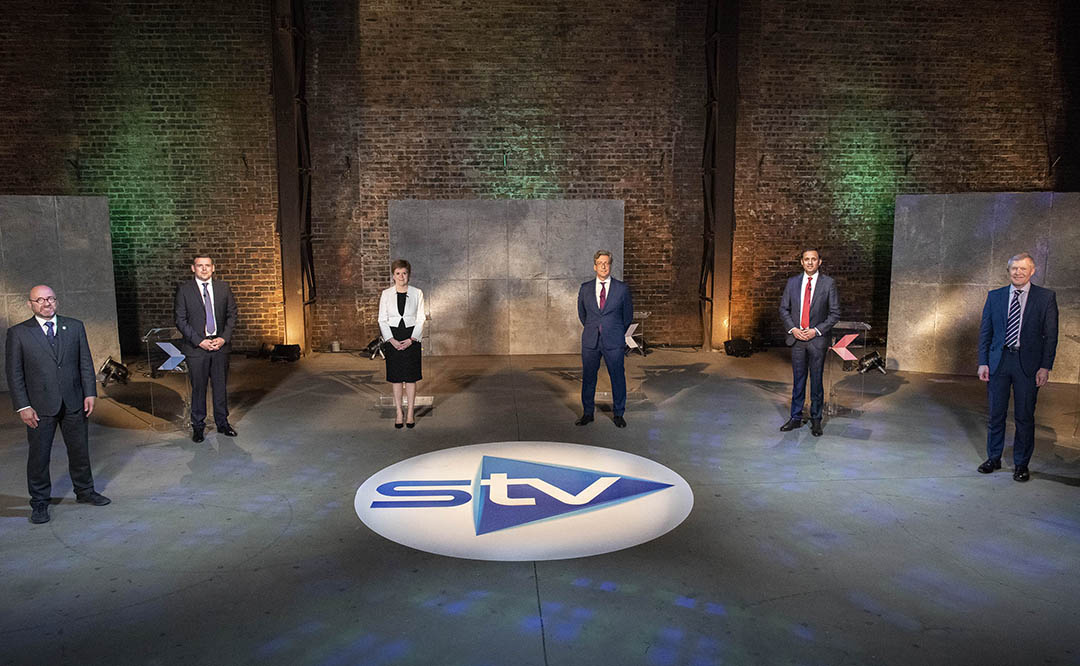For a leaders’ debate to be truly game-changing, it probably requires two things. First, the election has to be on a knife-edge. Consequently, any slip by a leader could prove fatal. And second, the issue which emerges from the crossfire dominates the agenda and shifts votes.
By that yardstick, it was never likely that this ninety-minute showdown would recast Election 2021. The polls are too consistent and the exchanges thus far too predictable to believe a piece of campaign television would materially shift those all-important numbers.
For all that, this debate was very watchable, chaired firmly and fairly by Colin Mackay. Unlike the previous TV debate of this election, it actually managed to cover a range of policy issues, outwith the inevitable discussion about IndyRef2.
And for once an outbreak of mea culpa. The First Minster was upfront in admitting that her government had taken their eye off the ball when it comes to the appalling level of drugs deaths in Scotland.
The Scottish Tory leader Douglas Ross repeated an apology about comments he has made in the past about gypsy travellers and he was also candid in admitting his party hasn’t done enough for fishing communities.
And a rare moment of consensus too. All of the leaders agreed that the key issue in the immediate aftermath of the election is economic recovery from the effects of the Covid pandemic.
For the political anoraks, the exchanges in the cross-examination sections of the programme must have felt a little like First Minster’s Questions. Nicola Sturgeon came under repeated attack on the record of her government – from missed targets on health waiting times to the lack of progress on closing the attainment gap in education.
Not to be outdone, Sturgeon went on the attack herself criticising the UK Government for challenging Scottish Parliament legislation on the rights of children and demanding to know from Scottish Labour’s Anas Sarwar how his party can deliver social justice for workers whilst leaving key powers at Westminster to be wielded by Boris Johnson.
And in a sign of the times, all of the leaders attempted to parade their green credentials, which allowed Patrick Harvie to remind viewers that there was only one party worth voting for when it came to being radical on climate change.
And in another sign of the times, none of the opposition leaders attempted to present themselves as a First Minister in waiting. There was an almost tacit acceptance that the polls can’t all be wrong and in all likelihood the SNP would win the election.
There is a pointless question that commentators are asked at the conclusion of these debates. Who won? It’s pointless because electors who have made up their minds will no doubt gravitate to the leader who reinforces their view of the world.
The real issue is if people are inclined to vote for a party as a result of hearing a point of view in the debate. It is, therefore, how the leaders perform among the undecideds that is really the key issue. I suspect in their own way, all of the participants will think, ‘job done’.
The First Minister defended her government’s record, which came under sustained attack, and reminded voters why the full powers of independence were necessary in her view. There was the odd uncomfortable moment but no gaffe that will dominate long after the studio lights go out.
Anas Sarwar has focused on the need for a post-Covid recovery plan. The fact that this debate was not entirely dominated by the constitution will probably please Labour who will feel that there was the time and space in the proceedings to get key messages across. I thought on substance Mr Sarwar was assured and extremely measured.
Douglas Ross was more combative and more composed compared to the BBC debate a few weeks back although he would have raised an eyebrow among his parliamentary colleagues when, in his opening statement, he appealed to viewers to give their list vote to the Scottish Conservatives. Seven Holyrood Tories represent constituencies.
Patrick Harvie is a seasoned performer and it showed again tonight. He described this election as the last one before the climate crisis gets out of control.
Willie Rennie in the past has been on the back foot as he has had to defend Lib Dem participation in the UK coalition Government between 2010-2015. For the first time in a long time he was not asked for repeated apologies for the perceived shortcomings of the Lib Dems in government.
He was strong, very strong in fact on the issue of more money for mental health services. His weakest moments related to his party’s position on the European Union and how precisely, they would get the country back into the EU.
I suspect the parties will all be pleased for different reasons. Forget the judgement of the Twitterati or the obligatory press releases claiming victory. The only judgement that counts is the one on May 6. The range of issues covered tonight might just have made up a few minds and in that sense I thought the debate was a worthwhile public service.

 STV
STV

























